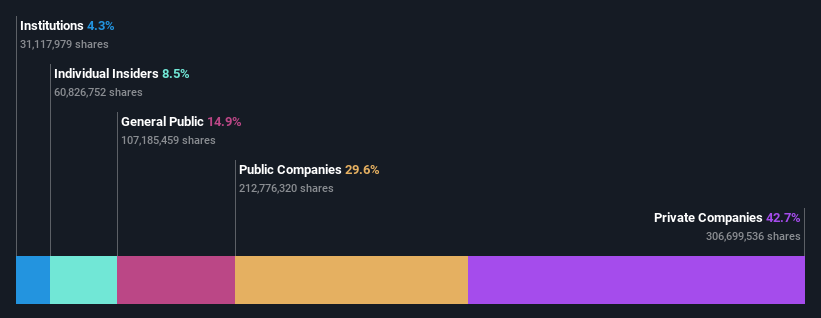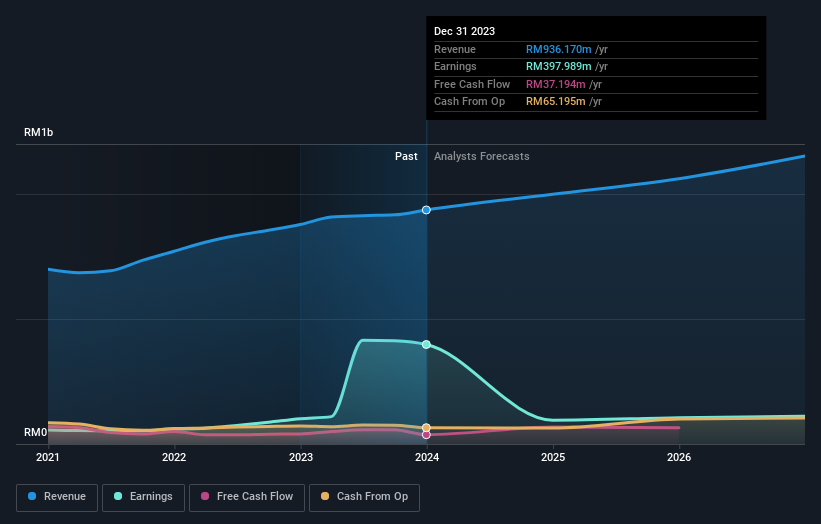Public companies own 30% of Apex Healthcare Berhad (KLSE:AHEALTH) shares but private companies control 43% of the company
Key Insights
Significant control over Apex Healthcare Berhad by private companies implies that the general public has more power to influence management and governance-related decisions
69% of the business is held by the top 2 shareholders
Analyst forecasts along with ownership data serve to give a strong idea about prospects for a business
A look at the shareholders of Apex Healthcare Berhad (KLSE:AHEALTH) can tell us which group is most powerful. The group holding the most number of shares in the company, around 43% to be precise, is private companies. In other words, the group stands to gain the most (or lose the most) from their investment into the company.
Public companies, on the other hand, account for 30% of the company's stockholders.
Let's delve deeper into each type of owner of Apex Healthcare Berhad, beginning with the chart below.
Check out our latest analysis for Apex Healthcare Berhad
What Does The Institutional Ownership Tell Us About Apex Healthcare Berhad?
Institutions typically measure themselves against a benchmark when reporting to their own investors, so they often become more enthusiastic about a stock once it's included in a major index. We would expect most companies to have some institutions on the register, especially if they are growing.
Institutions have a very small stake in Apex Healthcare Berhad. That indicates that the company is on the radar of some funds, but it isn't particularly popular with professional investors at the moment. If the company is growing earnings, that may indicate that it is just beginning to catch the attention of these deep-pocketed investors. When multiple institutional investors want to buy shares, we often see a rising share price. The past revenue trajectory (shown below) can be an indication of future growth, but there are no guarantees.
Apex Healthcare Berhad is not owned by hedge funds. Our data shows that Apex Pharmacy Holdings Sdn Bhd is the largest shareholder with 40% of shares outstanding. Washington H. Soul Pattinson and Company Limited is the second largest shareholder owning 30% of common stock, and Public Mutual Bhd. holds about 2.6% of the company stock. In addition, we found that Kirk Kee, the CEO has 1.2% of the shares allocated to their name.
A more detailed study of the shareholder registry showed us that 2 of the top shareholders have a considerable amount of ownership in the company, via their 69% stake.
While it makes sense to study institutional ownership data for a company, it also makes sense to study analyst sentiments to know which way the wind is blowing. Quite a few analysts cover the stock, so you could look into forecast growth quite easily.
Insider Ownership Of Apex Healthcare Berhad
While the precise definition of an insider can be subjective, almost everyone considers board members to be insiders. The company management answer to the board and the latter should represent the interests of shareholders. Notably, sometimes top-level managers are on the board themselves.
Insider ownership is positive when it signals leadership are thinking like the true owners of the company. However, high insider ownership can also give immense power to a small group within the company. This can be negative in some circumstances.
We can report that insiders do own shares in Apex Healthcare Berhad. It has a market capitalization of just RM2.4b, and insiders have RM206m worth of shares, in their own names. It is good to see some investment by insiders, but it might be worth checking if those insiders have been buying.
General Public Ownership
The general public, who are usually individual investors, hold a 15% stake in Apex Healthcare Berhad. This size of ownership, while considerable, may not be enough to change company policy if the decision is not in sync with other large shareholders.
Private Company Ownership
Our data indicates that Private Companies hold 43%, of the company's shares. Private companies may be related parties. Sometimes insiders have an interest in a public company through a holding in a private company, rather than in their own capacity as an individual. While it's hard to draw any broad stroke conclusions, it is worth noting as an area for further research.
Public Company Ownership
Public companies currently own 30% of Apex Healthcare Berhad stock. It's hard to say for sure but this suggests they have entwined business interests. This might be a strategic stake, so it's worth watching this space for changes in ownership.
Next Steps:
It's always worth thinking about the different groups who own shares in a company. But to understand Apex Healthcare Berhad better, we need to consider many other factors. To that end, you should learn about the 3 warning signs we've spotted with Apex Healthcare Berhad (including 2 which are a bit unpleasant) .
If you are like me, you may want to think about whether this company will grow or shrink. Luckily, you can check this free report showing analyst forecasts for its future.
NB: Figures in this article are calculated using data from the last twelve months, which refer to the 12-month period ending on the last date of the month the financial statement is dated. This may not be consistent with full year annual report figures.
Have feedback on this article? Concerned about the content? Get in touch with us directly. Alternatively, email editorial-team (at) simplywallst.com.
This article by Simply Wall St is general in nature. We provide commentary based on historical data and analyst forecasts only using an unbiased methodology and our articles are not intended to be financial advice. It does not constitute a recommendation to buy or sell any stock, and does not take account of your objectives, or your financial situation. We aim to bring you long-term focused analysis driven by fundamental data. Note that our analysis may not factor in the latest price-sensitive company announcements or qualitative material. Simply Wall St has no position in any stocks mentioned.

 Yahoo Finance
Yahoo Finance 

